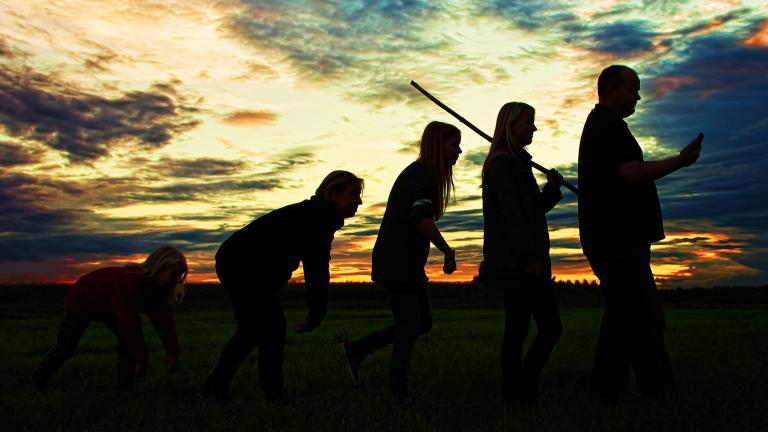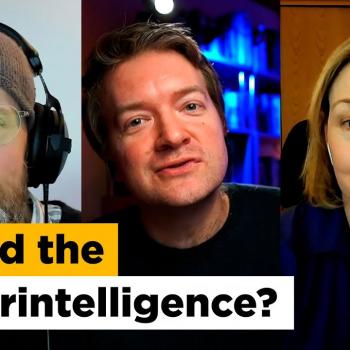
Does an evolutionary account of existence disprove God? Are there more plausible explanations than a divine creator for how we came to be? Erik Strandness shares his thoughts about the important stories we tell each other.
Unbelievable? has once again allowed us to peek inside the mind of a deconstructed Christian by featuring a thoughtful and respectful conversation between former believer Sam Devis – who has chronicled his journey in his When Belief Dies podcast – and Christian guest, Andrew Halestrap, emeritus professor of biochemistry and senior research fellow at Bristol University.
Devis’ testimony cannot be easily dismissed because he took his Christian faith quite seriously, even to the point where he considered making evangelism his life’s work. However, upon personal reflection and through the writings of others, particularly those of Yuval Noah Harari, he came to believe that the Christian story was not as compelling as he had been raised to believe. He summarized his personal crisis this way:
“I came to the realization that I had a very set structure to how I perceive and receive things, so the way I view people, the way I view nature, the way I view purpose, morality, meaning, all sorts of the big questions are very much focused through a Christian lens…I asked myself could I view these things through a different lens? Does this world make more sense with or without God?”
Devis’ main reasons for his deconversion were the realization that Christianity wasn’t the only story upon which to build one’s life and that every myth had at its center the illusory belief that humans were the pinnacle of the natural order. Christianity, like every other attempt at meta-narrative, was just another ode to unwarranted human arrogance.
Story Time
I appreciate Devis’ respect for the power of stories but I think he underestimates their significance. He believes humans are storytellers who spin yarns that create illusory tapestries that promote group cohesion and provide a stimulus for innovation.
“Humanity is a weaver of stories. We, as humans, have an innate ability to tell ourselves stories, tell the world around us stories, and these stories essentially bring us together, give us a joint narrative that we are then able to adhere to and do more because of.”
Devis, however, sells stories short when he reduces them to templates we place on the world to make it conform to our desires rather than as sincere attempts by humans to describe the world the way it really is.
“A good way to view this is through the idea of a heuristics, almost like a grid or pattern or framework we place over life to make sense of things.”
I think Devis needs to take a step back and ask an even more fundamental question – why are humans the only creatures on the planet that tell stories? If stories are merely tools for survival then why aren’t other species storytellers? What is the Simian narrative? The Cetacean narrative? It appears that despite a lack of storytelling skills they are still able to conduct monkey business as usual and even do a whale of job at maintaining their respective species. Stories are clearly not necessary for survival so why do humans tell them? I think that is a profound question that calls for a profound answer.
Improvisation or Grand Narrative?
Humans aren’t improvisers but storytellers. They are able to recall the past, anticipate the future and cast their lives in a narrative arc. Animals, on the other hand, are forced to improvise to every new suggestion nature throws their way.
I would argue that humans don’t create stories in order to control nature but to discover how they fit into the preexistent larger story swirling around them. We aren’t really that interested in the demanding task of writing our own stories, but are more concerned with finding out how our individual chapters fit into the Book of Life. It appears to me that the world already has a story and we have two choices – find our place in the divine literature or rewrite it as mortal fiction.
Why do we even think that telling stories is the proper way to navigate the world? Could it be that the world is more like a theatrical performance than evolutionary improvisation? I think life looks more like a grand story performed on a beautiful set, littered with intriguing animal props, and starring human characters obsessed with evolutionarily inconvenient thoughts of meaning and purpose, which they obsess over at the cost of foraging and fornicating. We have purpose because we are characters in God’s story and not props in a biological battle to be the most fit survivor ( I explore this idea in more detail in my book, ‘The Director’s Cut: Finding God’s Screenplay on the Cutting Room Floor’).
Storytelling is incompatible with a materialist view of the world because it requires one to have an out of body experience, transcend the immanent and step outside the evolutionary circle of life. Animals are stuck in the moment, grounded by the evolutionary demands of collocating chemicals, yet humans are capable of mental time travel fueled by memories of the past and hope for the future. Devis considers the Bible story to be fiction, perhaps one of many useful fictions, but a fiction nonetheless. Genesis, however, not only tells us how the story began but also explains why humans created in the image of the Master Storyteller are so obsessed with them.
Who has the Uber-Story?
Devis seems to believe that stories are constructs we place on the world in order to make it bend to our desires and that no one story has priority over another. If I have accurately distilled his beliefs, then he has to admit that Yuval Noah Harari’s book Sapiens is also telling a story, a story which Harari believes is the uber-story that explains all other stories.
If Devis is skeptical of the Bible story which has treasure troves of archeological, historical and manuscript evidence, he should perhaps be even more cautious about accepting a metanarrative that is based on the divination of a few sacred scientific bones. Dead men tell no tales but old men with pen and papyri do.
Harari’s Sapiens is fascinating because at its core it sounds rather Biblical. Harari describes a relatively peaceful group of hunter-gatherers who ate of the fruit of the agricultural revolution and then left their responsible garden tending ways behind only to exploit the wilderness. The resulting bounty of the harvest caused them to become fruitful and multiply. Finding it difficult to organize larger number of sapiens they made up stories that gave them the ability to control the population and eventually exploit the planet. His story sounds like mortals who suddenly developed a god-complex and spent the rest of their lives dealing with the consequences of their divine ambition. Is it possible that the Biblical story is the ultimate meta-narrative and all other stories just tip their hat to it?
Hominid Hubris
Harari’s book caused Devis to ask why humans are special:
“What makes us think that we are special? What is it specifically about people, humans today, homo sapiens, that gives us the right or the ability to say that we are special, that we are more important, that we are the pinnacle of something.”
First of all, how is it possible for matter to step outside of itself and then congratulate itself for being so darn smart? How can we grade ourselves if we are just students in the school of evolutionary hard-knocks? What is the survival advantage of creatures who think they are better than their less evolved ancestors?
Devis stated it was arrogant for humans to think they were the pinnacle of evolution but I would then ask him how it was even possible for random mutations and natural selection to produce a haughty human. Where did that come from? It’s one thing to be an evolved monkey but quite another to be an ape with an attitude. I know of no other successfully evolved creature that got to the top of the podium and then taunted the competition. A sense of entitlement sounds a bit more like someone with a God complex rather than good animal instinct.
Image-Bearing Evidence
As unique beings that bring spiritual traits to a physical planet we are also the most impressive evidence for the existence of God. We often get hot and bothered over the theological and philosophical arguments for God’s existence but seem oblivious to the fact that the only creatures arguing about it are humans. We get so distracted by the academic evidence that we fail to see the significance of the academicians. The planet is an evidence locker filled with 7 billion walking talking proofs for the existence of God. Every time you cross paths with another human being you are encountering another witness testifying on God’s behalf.
Critics of Christianity label us as knuckle-dragging primitives clinging to the illusion that we have been created in a divine image, but then sadly consider their greatest intellectual achievement the discovery that humans are just animals. If you hold man with such contempt then you cannot be surprised when he acts contemptuously. If, however, you hold him in high esteem you are justified in expecting him to act estimable. You can howl at the moon or offer prayers to God but either way you will end up worshiping your maker.
Pattern Seeking Creature
Devis considers stories to be templates we place on reality to navigate it physically and emotionally. The problem is that we don’t create patterns, we look for them. For instance, scientific research is the search for patterns in nature. If all we did was manufacture templates for living then there would be no need to test them in the laboratory. My physiology textbook is a description of the way the body works and not the way I want it to work, and I would argue that it is when physicians impose their theories on the world without testing that problems arise.
An unexamined life occurs when we create a story but don’t do the hard work of finding out whether or not it matches reality. I would even go so far as to suggest that the rising incidence of anxiety and depression is due to the cognitive dissonance we experience when the stories we tell ourselves don’t line up with reality.
Harari tells us an evolutionary tale that may account for some phenomenon in plants and animals but falls short when it comes to describing the uniqueness of man. Perry Marshall makes a fascinating statement about the limits of evolutionary theory as a useful template in his book ‘Evolution 2.0’:
“If blind evolutionary forces can produce eyes and hands and ears and millions of species, then why don’t engineers use Darwinian evolution to design cars or write software? Why don’t they teach Darwinism in engineering school? Evolution and natural selection, after all, were heralded as all-powerful, to the point of having godlike qualities. If nature needs no engineers, a little evolution knowledge would surely be useful to us engineers who are stuck in cubicles designing cell phones.”
The Greatest Story Ever Told
I appreciate the journey that Devis is on and his willingness to share his thoughts with the rest of us. I think he is spot-on with his emphasis on the importance of stories, but I think he underestimates just how transcendent the concept of narrative truly is. I think it is very difficult for a materialist to explain arrogant storytellers. What is more plausible, matter writing a memoir, or a soul writing a sonnet? If we think that the world must be described as a story then maybe we need to spend less time writing our own pulp fiction and spend more time looking for the Author of the greatest story ever told.
“If the God of the Bible exists, he is not a man in the attic, but the Playwright. That means we won’t be able to find Him like we would find a passive object with the powers of empirical investigation, Rather, we must find the clues to his reality that he has written into the universe, including into us.” Timothy Keller, The Reason for God: Belief in an Age of Skepticism.
Listen to more of Sam Devis’ story
Subscribe to the Unbelievable? podcast












